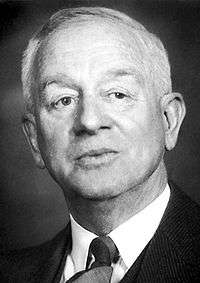Francis Peyton Rous
Francis Peyton Rous ForMemRS[1] (/raʊs/) (October 5, 1879 – February 16, 1970) was an American Nobel Prize-winning virologist.
Francis Peyton Rous | |
|---|---|
 Francis Peyton Rous | |
| Born | October 5, 1879 Baltimore, Maryland |
| Died | February 16, 1970 (aged 90) |
| Nationality | American |
| Alma mater | Johns Hopkins University, Johns Hopkins School of Medicine |
| Known for | Oncoviruses |
| Awards |
|
| Scientific career | |
| Fields | Virology |
Education and early life
Rous was born in Woodlawn, Maryland in 1879 and received his B.A. and M.D. from Johns Hopkins University.[2]
Career and research
Rous was involved in the discovery of the role of viruses in the transmission of certain types of cancer. On October 13, 1966, he was awarded a Nobel Prize in Physiology or Medicine for his work.
In 1911, as a pathologist, he made his seminal observation that a malignant tumor (specifically, a sarcoma) growing on a domestic chicken could be transferred to another fowl simply by exposing the healthy bird to a cell-free filtrate.[3][4] This finding, that cancer could be transmitted by a virus (now known as the Rous sarcoma virus, a retrovirus), was widely discredited by most of the field's experts at that time. Since he was a relative newcomer, it was several years before anyone even tried to replicate his prescient results. However, some influential researchers were impressed enough to nominate him to the Nobel Committee as early as 1926 (and in many subsequent years). Rous finally received the award 40 years later at the age of 87; he remains the oldest recipient of the Nobel Prize for Medicine or Physiology.[5]
Awards and honors
In addition to the Nobel Prize, Peyton Rous was elected a Foreign Member of the Royal Society (ForMemRS) in 1940,[1] and he won the Albert Lasker Award for Basic Medical Research in 1958 and the National Medal of Science in 1965.
Personal life
In his later life he wrote biographies of Simon Flexner[6] and Karl Landsteiner.[7]
His wife Marion died in 1985. His daughter Marni Hodgkin was a children's book editor, and the wife of another Nobel Prize winner, Alan Lloyd Hodgkin.[8]
References
- Andrewes, C. H. (1971). "Francis Peyton Rous. 1879-1970". Biographical Memoirs of Fellows of the Royal Society. 17: 643–662. doi:10.1098/rsbm.1971.0025. ISSN 0080-4606. PMID 11615431.
- "Peyton Rous – Biography". Nobelprize.org. Retrieved 6 June 2011.
- Rous, Peyton (1910). "A Transmissible Avian Neoplasm (Sarcoma of the Common Fowl)". Journal of Experimental Medicine. 12 (5): 696–705. doi:10.1084/jem.12.5.696. PMC 2124810. PMID 19867354.
- Rous, Peyton (1911). "A Sarcoma of the Fowl Transmissible by an Agent Separable from the Tumor Cells". Journal of Experimental Medicine. 13 (4): 397–411. doi:10.1084/jem.13.4.397. PMC 2124874. PMID 19867421.
- Rous as oldest recipient of the Nobel Prize for Medicine or Physiology
- Rous, P. (1949). "Simon Flexner. 1863-1946". Obituary Notices of Fellows of the Royal Society. 6 (18): 408–426. doi:10.1098/rsbm.1949.0006.
- Rous, P. (1947). "Karl Landsteiner. 1868-1943". Obituary Notices of Fellows of the Royal Society. 5 (15): 294–324. doi:10.1098/rsbm.1947.0002.
- Ann Thwaite. "Marni Hodgkin obituary | Books". The Guardian. Retrieved 2016-03-11.
Further reading
- Cornwall, Claudia M. Catching cancer : the quest for its viral and bacterial causes. Lanham: Rowman & Littlefield Publishers, 2013.
- Raju, T. N. (1999). "The Nobel Chronicles". The Lancet. 354 (9177): 520–527. doi:10.1016/S0140-6736(05)75563-X. PMID 10465213.
- Dulbecco, R. (1976). "Francis Peyton Rous". Biographical Memoirs of the National Academy of Sciences. 48: 275–306. PMID 11615657.
- "Francis Peyton Rous, M.D. Johns Hopkins". Lancet. 1 (7644): 477. 1970. doi:10.1016/s0140-6736(70)90876-7. PMID 4189793.
- Sulek, K. (1969). "Nobel prize for Francis Peyton Rous in 1966 for the discovery of carcinogenic viruses and for Charles Huggins for the introduction of hormones for treatment of neoplasms". Wiadomosci Lekarskie (Warsaw, Poland : 1960). 22 (12): 1161–1162. PMID 4896432.
- Datta, R. K.; Datta, B. (1967). "Nobel prize winners in medicine". Journal of the Indian Medical Association. 48 (1): 41–42. PMID 5342283.
- Graffi, A. (1966). "Francis Peyton Rous". Deutsche Medizinische Wochenschrift. 91 (51): 2309–2310. PMID 5333372.
- Kreyberg, L. (1966). "Nobel prize in physiology and medicine 1966 (Rous FP)". Tidsskrift for den Norske Laegeforening: Tidsskrift for Praktisk Medicin, NY Raekke. 86 (22): 1565. PMID 4859882.
- "Nobel Prize". BMJ. 2 (5520): 964. 1966. doi:10.1136/bmj.2.5520.964.
- Rhoads, C. P. (1959). "Citation and presentation of the Academy Medal to F. Peyton Rous". Bulletin of the New York Academy of Medicine. 35 (4): 216–219. PMC 1806149. PMID 13629203.
- Nobel Lectures, Physiology or Medicine 1963–1970, Elsevier Publishing Company, Amsterdam, 1972
